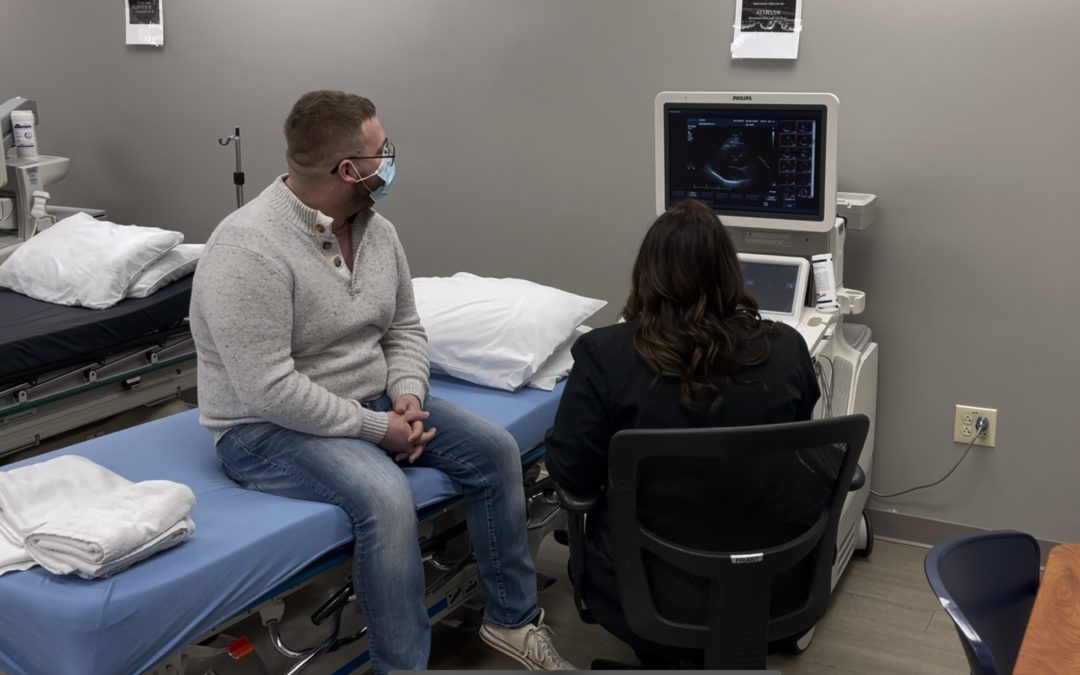MedQuest College students in the Sonography Training Program are two for two for being credited with helping to find heart issues that saved lives. First was Hunter Brown, a recent graduate of the Cardiovascular Sonography program.
Hunter was just trying to get some extra practice when he scanned his father’s heart last summer – but he found a life-threatening condition that required urgent surgery.
Now, another Lexington man has something extra to be thankful for – and his effort to help another sonography training program student may have saved his own life!
Chris Ward was working in the admission’s office at MedQuest when a student from the school’s sonography training program asked if she could do a heart scan on him for practice.
Students in the sonography/echocardiography program frequently ask staff members for help because they want to practice using the equipment and reading the results. Chris, himself a MedQuest graduate, was happy to assist. Neither he, nor the student, were expecting anything out of the ordinary.
Scan Results in Emergency Room Visit
“We do these scans a lot,” said Jessica Begley, who will graduate from the sonography program in the summer of 2021. “But we are always looking at young, healthy people. I just expected to see another normal heart.”
Right away though, Jessica noticed something unusual in Chris’s heart. There was a significantly enlarged ventricle and an abnormally dilated aorta. To be sure, she repeated the procedure and took his blood pressure, finding it to be dangerously high. Untreated, he was in danger of having a stroke.
Begley was so concerned that she drove Ward to the emergency room.
“It was hard not to feel like she was overreacting,” said Chris. “Because I felt ok and was only getting a scan to help her out. But the hospital confirmed what she said – that it was super important that I came in.”
“I’m really lucky.”
Chris said that Jessica stayed in close contact with him as he was seeing doctors and getting treatment, making sure that he got the care he needed. He is now using his MedQuest dental assisting certificate to work at a Georgetown periodontal office.
Jean Roberts, program director for the Diagnostic Medical Sonography program, said this kind of experience makes a big impression on all the MedQuest students. “They all know that the work they are learning to do is important, but that first experience of catching something… that’s a moment you never forget.”
Ward said it’s hard to think about how differently things could have turned out. “What if I’d not been there that day, or if I had said I was too busy to do the scan,” he said. “I’m really lucky.”
As for Begley, she said it has made her feel even better about her career choice.
“When you go into healthcare, you know you will help save lives,” she said, “but I didn’t expect to save a life that day, while just a student. This has made me feel like I picked a career that will make a difference.”
Sonography Training Program Objectives
Completion of the Diagnostic Medical Sonography program at MedQuest College is designed to prepare competent entry-level echocardiography sonographers.
Upon completion of the program and meeting all of the course requirements, students will receive an Associate of Applied Science Degree and will be prepared and eligible to submit their Degree and transcript to apply to take the primary pathway certification and registry through the Cardiovascular Credentialing International (CCI).
After successful completion of the national examination, students will obtain the credential Registered Cardiac Sonographer with the abbreviation RDC in connection with his or her name.
To learn more about the Sonography Training Program, get in touch with a MedQuest admissions advisor. They will be happy to share more information with you or schedule a virtual tour.

